Israel And Arab Conflict: Background, History and Key Events
| Table of Contents |
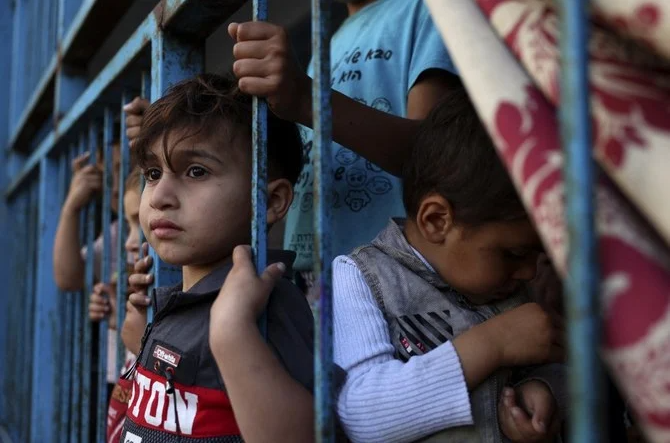 |
| Children have been severely impacted by the latest flare-up of violence between Israelis and Palestinian factions in Gaza |
Israel And Arab World Conflict: Deep Roots in Religion
To a large extent, the modern Arab-- Israeli conflict is defined by the religious beliefs of the contending parties, as well as their ideas about the chosen people and their policies regarding the "Promised Land" and the "Chosen City" of Jerusalem. Canaan, or Eretz Yisrael, is supposedly the location of a promise from God to the Israelites in the Hebrew Bible. This is also mentioned in the Qur'an.
Muslim claimants to that land also make that claim in the Quran. In contrast to the Jewish belief that the Land of Canaan was exclusively promised to the descendants of Abraham's grandson Jacob (Yisrael), the Arabs assert that Abraham's eldest son, Ishmael, was bestowed upon him. The Temple Mount, the Cave of the Patriarchs, and many other sites revered by the ancient Israelites are also highly esteemed by Muslims. Dome of the Rock and Al-Aqsa Mosque on the Temple Mount—the holiest site in Judaism—are two Islamic landmarks that Muslims have constructed on these historic Israelite locations during the last 1,400 years.
As a result, tensions have escalated between the two factions over who should govern Jerusalem. Common belief holds that Muhammad's first journey to paradise began in Jerusalem. All of Palestine, including what is now Israel and the Palestinian territories, is an Islamic waqf that Muslims must administer, says Hamas, the group controlling the Gaza Strip.
Check more: Why Does America Support Israel As A Best Friend?
What is Zionism?
The goal of the Jewish nationalist movement called Zionism has been to build and support a Jewish national state in Palestine. Ziionism has its roots in eastern and central Europe in the late 1800s, but it is also a continuation of the Jewish people's long-standing ties to Palestine. According to Britannica, one of the hills of ancient Jerusalem was called Zion.
The British government got permission from the League of Nations in 1920 to administer a mandate over Palestine in order to support the creation of a Jewish national home. This was stated in the Balfour Declaration, which was released three years earlier. The Arab people of Palestine, who were left out of the agreement, would strongly protest, which would go against their strategic goals and the progress made toward historical justice for the scattered and persecuted Jewish people in the Bible. Because of this, the Jewish and Muslim communities went beyond their religious roles to become national groups as well.
An Austrian journalist named Theodor Herzl gave Zionism a political turn. He thought that assimilation was the best thing that could happen but couldn't because of anti-Semitism. He said that the only way Jews could live normally if they were forced to become a nation was to live together in one place. Herzl held the first Zionist Congress in Basel, Switzerland, in 1897. That's where the movement's Basel program was written. It said: "Zionism strives to create for the Jewish people a home in Palestine secured by public law."
Iran launches missile attack on Israel
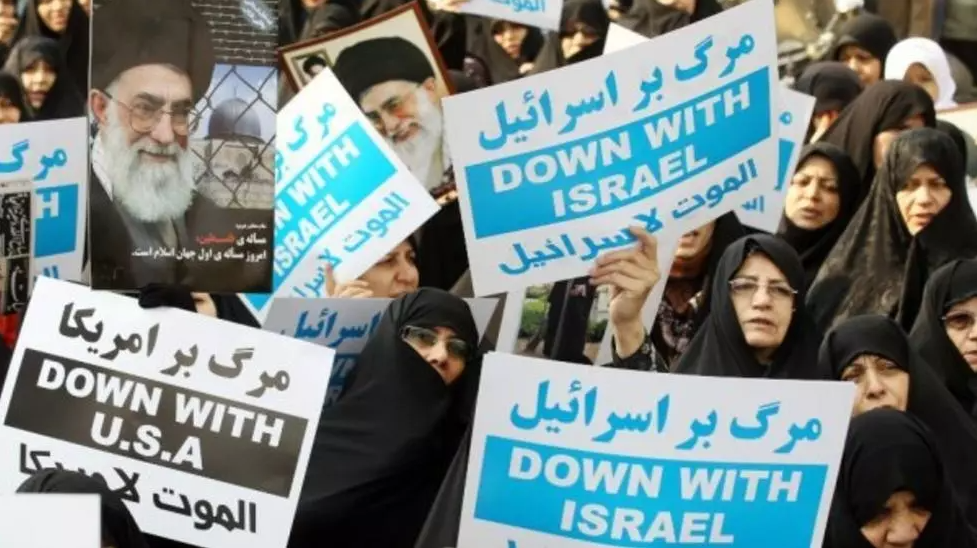 |
| An anti-Israel demonstration in Tehran in 2012. (Photo: AFP) |
Timeline of Arab–Israeli War
The Arab-Israeli war was series of military conflicts between Israeli forces and various Arab forces, most notably in 1948–49, 1956, 1967, 1973, 1982, and 2006.
1948–49: Israel’s War of Independence and the Palestinian Nakbah
In November 1947, the British Mandate of Palestine was split into two states: one for Jews and one for Arabs. This was done in line with UN Resolution 181. In Palestine, Jews and Arabs started fighting right away. Conflict got worse as British troops got ready to leave Palestine. Fighting broke out between Jewish and Arab forces. The attack on the Arab village of Dayr Ysn on April 9, 1948, was one of the most well-known events. Irgun Zvai Leumi and the Stern Gang killed a lot of people there, which spread fear and made people want to fight back. A few days later, Arab forces attacked a Jewish convoy on its way to Hadassah Hospital, killing 78 people.
Jerusalem declared its independence from Britain on May 15, 1948, one day before the British were to leave. The next day, Arab forces from Egypt, Transjordan (Jordan), Iraq, Syria, and Lebanon took over east Jerusalem, including the small Jewish Quarter of the Old City. They also took over the southern and eastern parts of Palestine that the UN's partition plan had not given to the Jews. Once the British left, the invasion's stated goal was to bring back law and order. This was okay because of things like what happened at Dayr Ysn and the fact that the refugee crisis in nearby Arab countries was getting worse. During this time, the Israelis fought off many Arab attacks and kept control of the main road to Jerusalem, which went through the Yehuda Mountains, which are also called the "Hills of Judaea." By early 1949, the Israelis had taken over the whole Negev, up to the old border between Egypt and Palestine, except for the Gaza Strip.
As a result of separate armistice agreements between Israel and each of the Arab states, a temporary border was set up between Israel and its neighbors from February to July 1949. For Israel, the war is called its "War of Independence." In the Arab world, the war was called the Nakbah, which means "catastrophe," because it forced so many people to leave their homes.
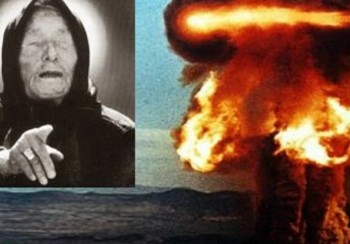 Fact-Check: Vanga Predicted the War Between Israel and Hamas? Fact-Check: Vanga Predicted the War Between Israel and Hamas? The bloody war between Israel and the military group Hamas in the Gaza Strip broke out on October 7, 2023, sparking controversy about "Did prophet ... |
1956: Suez Crisis
As soon as Gamal Abdel Nasser, an ardent Pan-Arab nationalist and President of Egypt, took office, tensions rose again. Nasser didn't like Israel and wanted to destroy it. In 1956, Nasser took over the Suez Canal, which links Europe and Asia and was mostly owned by French and British companies. In response, France and Britain made a deal with Israel, whose ships were not allowed to use the canal and whose southern port of Elat was blocked by Egypt. France and Britain would invade Egypt and then take control of the canal, saying they were trying to make peace.
In October 1956, Israel invaded the Sinai Peninsula in Egypt. In just five days, the Israeli army took over Gaza, Rafa, and Al-Arsh, taking thousands of prisoners with it. It now controls most of the peninsula east of the Suez Canal. After that, the Israelis used the Gulf of Aqaba to set up sea communications. After the joint intervention by Britain and France in December, the UN Emergency Force was sent to the area. Israeli forces left the area in March 1957. Arabs thought Egypt had won the Suez Crisis, as it is sometimes called, even though its forces had been beaten on every front. Egypt took down the wall around Elat. A UN buffer force was sent to the Sinai Peninsula.
1967: Six-Day War
Arab and Israeli forces fought for the third time between June 5 and June 10, 1967. This time, it was called the Six-Day War (or June War). At the beginning of 1967, Syria increased the number of Israeli villages it bombed from the Golan Heights. Nasser gathered his troops near the border with Sinai and told the UN force to leave. He then tried again to blockade Elat after the Israeli Air Force shot down six Syrian MiG fighter jets in response. In May 1967, Egypt and Jordan agreed to share the costs of defense.
As a result of what seemed like an Arab rush to war, Israel launched an unplanned airstrike that destroyed Egypt's air force on the ground. The Israeli army also easily won the battle. Israeli troops drove Syrian troops off the Golan Heights and kicked Jordanian troops out of the West Bank. They also took over Egypt's Gaza Strip and Sinai Peninsula. It's important to note that Jerusalem stayed completely under Israeli control.
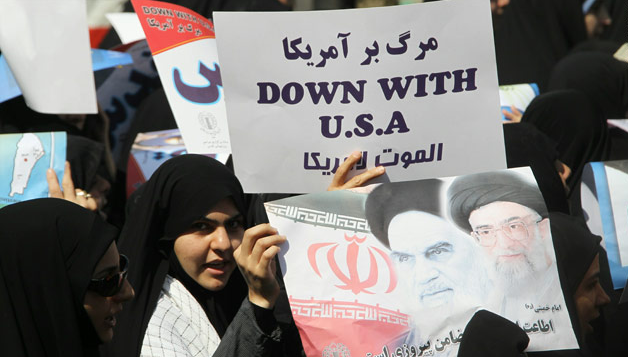 |
| Iranian protesters hold anti-Israel and anti-US placards during the Jerusalem Day march in Tehran on September 3, 2010. (Photo: CNN) |
1973: Yom Kippur War
After the Six-Day War, there was some fighting here and there, which turned into a full-blown war in 1973. Egypt crossed the Suez Canal and Syria entered the Golan Heights on October 6, which was the Jewish holiday of Yom Kippur (hence the name "Yom Kippur War"). This caught Israel off guard. It was worse than in previous wars because the Arab armies were more aggressive and ready to fight. The Israeli forces also suffered a lot. The Israeli army, on the other hand, came back from many early losses and moved into Syrian territory. It also surrounded the Egyptian Third Army by crossing the Suez Canal and setting up camp on the western shore of the water. That being said, Egypt never rebuilt the fortifications along the Suez Canal that it had destroyed in its first victories.
The fighting stopped on October 26. It had been going on all through the Islamic holy month of Ramadan. Israel made its peace deals with Egypt and Syria official on May 31, 1974, and November 11, 1974. Egypt and Israel signed a disengagement agreement on January 18, 1974. It said that Egypt would reduce its military presence in the Sinai and Israel would pull back into the area west of the Mitla and Gidi passes. A UN peacekeeping force was set up between the two armies. Along with this one, a second one was signed on September 4, 1975.
Three decades of war between Israel and Egypt came to an end on March 26, 1979, when they signed a peace agreement. As part of the deal, which was made possible by the Camp David Accords signed in 1978, Israel gave Egypt the whole Sinai Peninsula in exchange for Egypt acknowledging Israel's right to exist. After that, regular diplomatic ties were made between the two countries.
1982: Lebanon War
Because of rising tensions between Israelis and Palestinians, Israel bombed Beirut and southern Lebanon on June 5, 1982. This was less than six weeks after the Palestine Liberation Organization (PLO) had left the Sinai. Israel invaded Lebanon the next day, and by June 14 its land forces had encircled Beirut and reached its outskirts. But the Israeli government chose to stop moving forward and start talking with the PLO instead. With the help of a multinational force, the PLO left the city after a long delay and a lot of Israeli shelling of west Beirut. In the end, Israeli soldiers left west Beirut, and by June 1985, they were no longer in Lebanon at all.
2006: Second Lebanon War
Hezbollah launched an operation against Israel in July 2006 in an effort to put pressure on the government to free Lebanese prisoners. The operation resulted in the deaths of several Israeli soldiers and the capture of two others. Israeli forces invaded southern Lebanon in an offensive to reclaim the captured soldiers. More than a thousand Lebanese were killed and about one million were displaced during the 34-day conflict. Hezbollah has come under fire from several Arab leaders for igniting the conflict. However, Hezbollah received praise from a large portion of the Arab world for its ability to battle the Israel Defense Forces to a standstill.
2006-the 2010s: Israel - Iran conflict
Hamas terrorists took Israeli soldier Gilad Shalit hostage in June 2006 after breaking into an army post near the Israeli border with the Gaza Strip. Two IDF soldiers were killed in the attack, and Shalit was hurt when an RPG hit his tank. This was three days after Israel started Operation Summer Rains to get Shalit released. He was held hostage by Hamas until October 18, 2011, when he was traded for 1,027 Palestinian prisoners. They were not allowed to see him until that date.
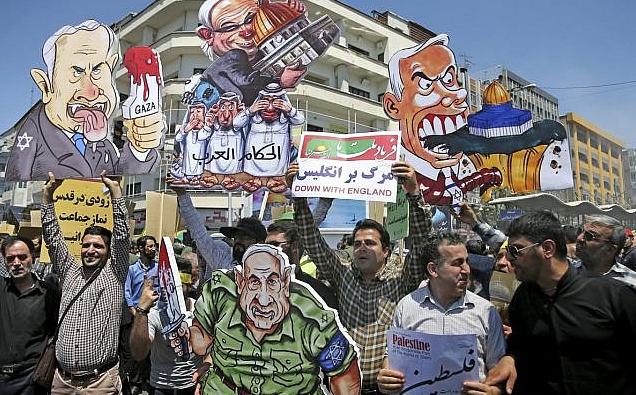 |
| Iranian protesters hold up caricatures of leaders of Israel during the annual anti-Israeli Al-Quds, Jerusalem, Day rally in Tehran, Iran, Friday, June 8, 2018. (Photo: AP) |
Israeli normalization with Gulf states and Sudan
The Arab-Israeli alliance against Iran was formed in November 2017 when relations between Israel and the Gulf States got better. It got a lot of attention from the media after the Warsaw Conference in February 2019. The coordination happened because of the standoff in the Middle East between Israel and the Sunni Arab states led by Saudi Arabia, which was against Iranian interests. There were also proxy wars going on between Iran, Saudi Arabia, and Israel. The main countries in the Gulf Cooperation Council are the Arab countries that are in the coordination group. Some of them are Oman, the United Arab Emirates, and Saudi Arabia. There was a trip by Israeli Prime Minister Benjamin Netanyahu to Oman in 2018. They met with Sultan Qaboos and other important Omani officials.
Abdel Fattah al-Burhan, who is the head of Sudan's sovereign council, and Benjamin Netanyahu, who is the prime minister of Israel, met in Uganda in February 2020 and agreed to improve relations between their countries. Later that month, Israeli planes were given permission to fly over Sudan. After this, on August 13, 2020, Israel and the United Arab Emirates (UAE) signed the Abraham Accords. Between the two countries, the treaty was meant to end their war. Israel also agreed to delay its plans to take over the Jordan Valley.
Israel - Arab current relations: Arab world expresses solidarity with Palestine amidst Israel bombardmentA number of Arab states have expressed their support for Palestine as a result of Israel's military operations against militants in the occupied territory, which have increased violence in Sheikh Jarrah, Gaza, and the West Bank. Saudi Arabia is spearheading Arab roundtable discussions regarding the dispute between Israel and Palestine at the UN, according to state news agency SPA. According to the report, Volkan Bozkir, the president of the General Assembly, met with Abdallah Yahya Al-Mouallimi, the Kingdom's permanent representative at the UN, to discuss the recent Israeli attacks. Al-Mouallimi reportedly also had a meeting with China's permanent envoy to the international body. The UAE's minister of foreign affairs and international cooperation, Abdullah bin Zayed Al-Nahyan, also voiced his worries about the escalating hostilities between Israel and Palestine. According to the Iraqi news agency INA, Turkish President Recep Tayyip Erdogan and Iraqi Prime Minister Mustafa Al-Kadhimi confirmed the Palestinian people's right to establish their own state over the phone. According to the report, Baghdad residents came together to protest Israeli attacks against "defenseless Palestinians" and "the violation of Islamic sanctities in the Al-Aqsa Mosque," which is consistent with the support expressed by the Iraqi leader. Furthermore, a statement supporting the Palestinians' right to peace and their capacity to create a sovereign state was issued by the Presidency of Tunisia. As per the official news agency of Tunisia, TAP, the presidency has denounced "the provocations and violations committed by the occupation forces in the precincts of the holy places and which have already caused several "innocent" victims." |
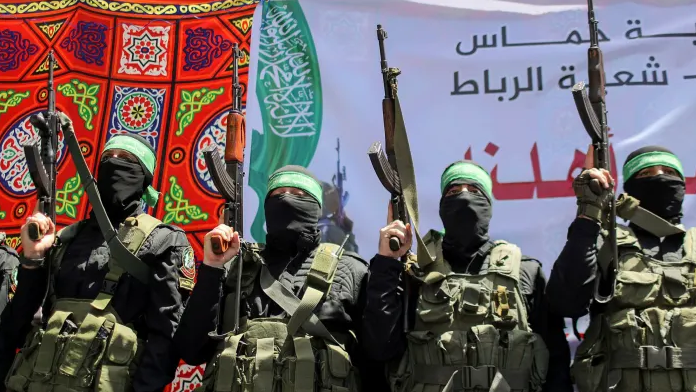 What is Hamas & Why it attacks Israel? What is Hamas & Why it attacks Israel? Fightings between Hamas and Israel are global hot news these days. What is Hamas and Why do they fight against Israel? Find out right ... |
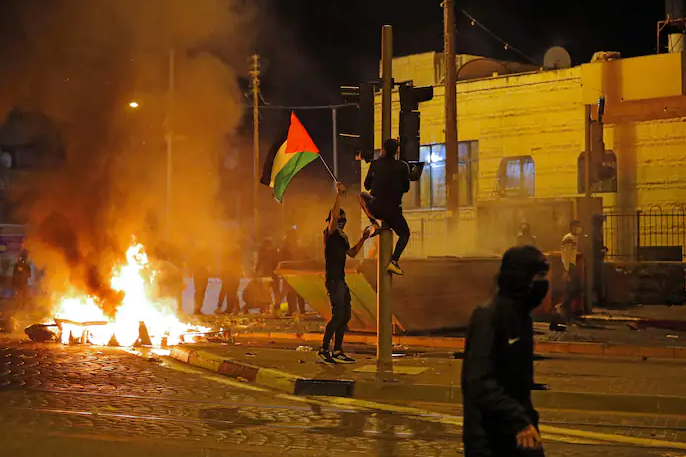 Israel – Palestine Conflict: History, Timeline, Cause and Everything to Know Israel – Palestine Conflict: History, Timeline, Cause and Everything to Know Israel – Palestine Conflict is one of the most severe and longest-running disputes in the world. In this article, you will be introduced to facts ... |
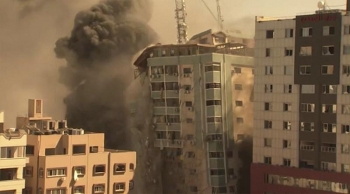 Israel - Gaza Conflict Latest News: Strike destroys building with AP, Al-Jazeera, other media Israel - Gaza Conflict Latest News: Strike destroys building with AP, Al-Jazeera, other media Israel-Gaza Attack News Updates: An Israeli airstrike destroyed a high-rise building in Gaza City that housed offices of The Associated Press and Al Jazeera .. |























